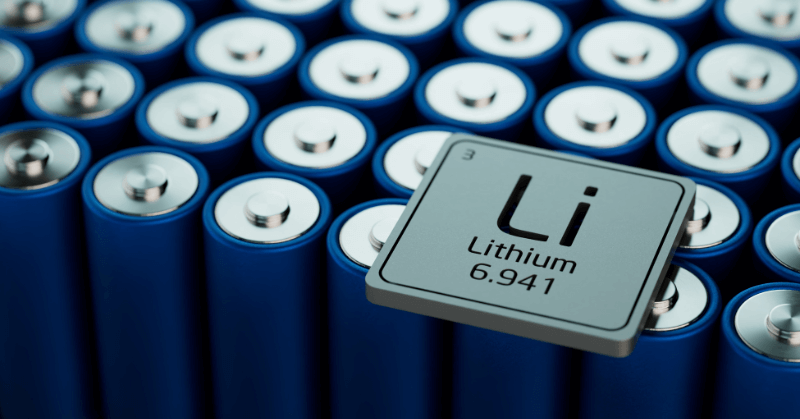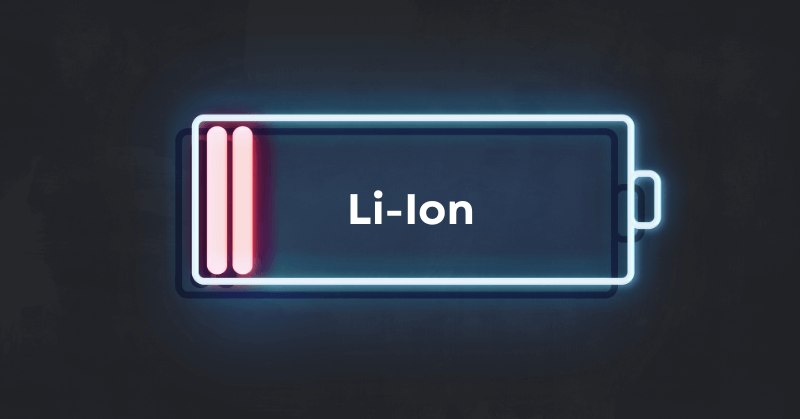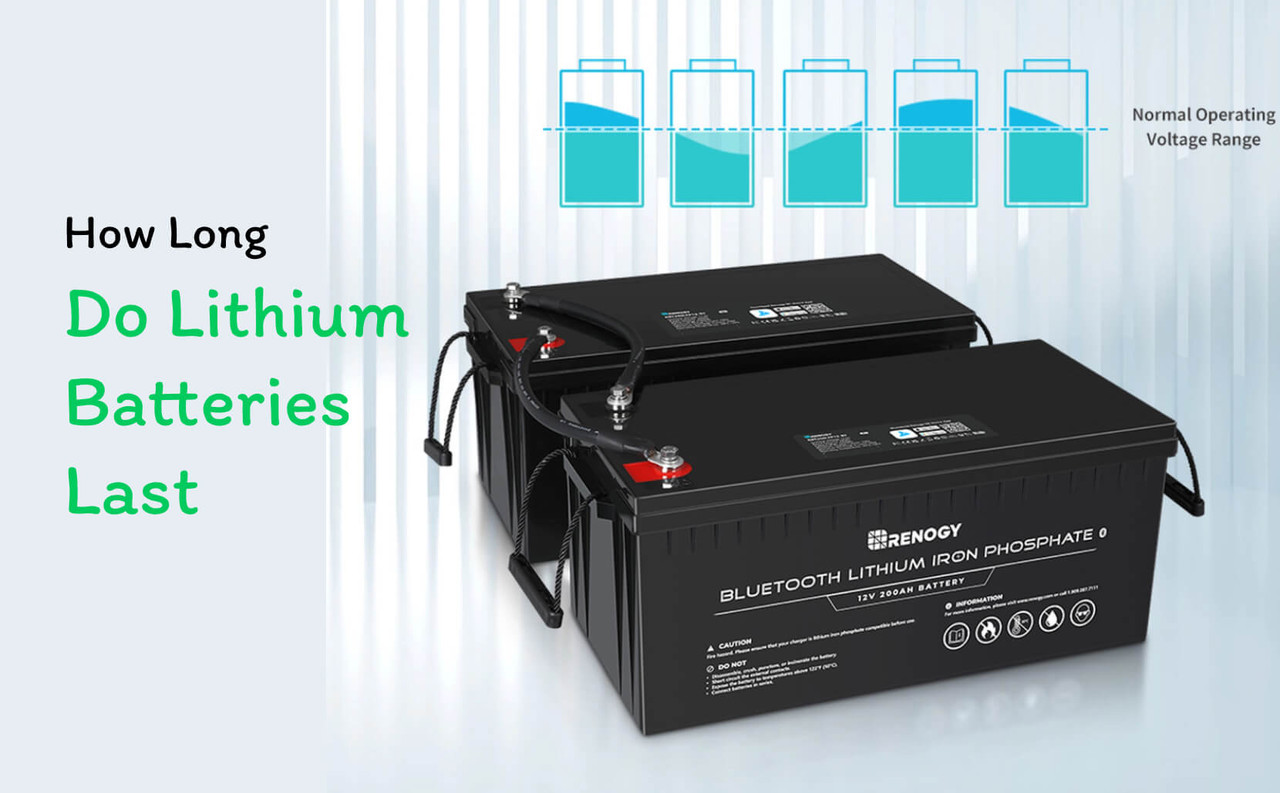How Long Do Lithium Batteries Last? A Comprehensive Guide
In the world of batteries, lithium batteries have a special place. They are rechargeable batteries. You can use them multiple times by charging them as many times as you need until their lifespan reaches. The lifespan of a battery is a period during which it perfectly powers up electronic devices and does not lose more than 20% of its total capacity.
Knowing the battery's lifespan is important because it tells you when to replace a battery. Lithium batteries are used in different devices, including electric vehicles, mobile phones, cameras, laptops, emergency power backup sources, and more.
Do you want to know, "How long do lithium batteries last?" The guide below presents a comprehensive answer to this query, including the battery's lifespan, how you can extend it, and much more. Let's get deeper into the discussion.
How long does the lithium battery last?
As we all know, a range of batteries is available on the market, such as lead-acid batteries, nickel-cadmium batteries, lithium batteries, nickel-metal hydride batteries, and the list continues. When it comes to the overall performance and lifespan, lithium batteries are more efficient and last longer than all others. This ability has made them stand out in the market.
Among all deep-cycle batteries, the lithium battery lifespan is the longest one. Many lithium batteries can last for 3,000 to 5,000 partial cycles. On the other hand, a lead-acid battery can only give 500 to 1,000 partial cycles. This number is quite low compared to lithium batteries.

Lithium batteries are also categorized into different types, such as lithium-ion, lithium iron phosphate, lithium polymer, and lithium manganese oxide. Each has a different lifespan. For example:
- The li ion battery life expectancyis 2 to 10 years. It is often used in electric vehicles and portable electronic devices. The latest versions support at least 2,000 charging cycles.
- The lithium iron phosphate (LiFePO4) battery is known for its longevity and safety. It can last somewhere between 5 and 15 years. It is usually used in logistics vehicles, buses, and passenger cars. It supports up to 5,000 charge cycles.
- A lithium polymer (LiPo) battery has a lifespan of 2 to 5 years. It is commonly installed in remote-controlled devices and drones. The typical battery has a lifespan of around 300 to 500 charge cycles.
- The lithium manganese oxide (LiMn2O4) battery can last for 3 to 7 years. It is often used in medical devices and power tools. This battery supports up to 500 to 1,000 charge cycles.
Don't forget to explore a decent stock of long-lasting, 12V lithium iron phosphate batteries at Renogy.
How to prolong the lithium battery lifespan?
Batteries are indeed the most expensive component of any electronic or electrical device. You will always want to increase its lifespan to avoid repetitive investments in buying new batteries after a short period. This section explains how you can prolong the lifespan of your lithium batteries efficiently. Here are the things you must keep in mind.

1. Use original chargers
Always use a charger designed explicitly for lithium batteries. Simply put, use a charger provided by the manufacturer. The reason behind this fact is that the original chargers are known for prolonging their lifespan because they receive the correct current and voltage. Hence, the damage is protected.
2. Never expose a battery to high temperatures
When a battery is in operation and is exposed to high temperatures, this situation can trigger electrolyte oxidation and increase SEI thickness. It may lead to a reduced lifespan or capacity loss. Therefore, whenever you store a battery, make sure it is not exposed to extreme heat or high temperatures.
3. Store your battery at moderate temperature
It is always recommended to use or store your battery at a moderate temperature, ranging from 5 degrees Celsius to 20 degrees Celsius. In other words, try storing a lithium battery at room temperature. Doing this will help your battery last longer and perform well throughout its lifespan.
4. Discharge and charge partially
Many consumers are not aware of this fact, and they usually recharge a battery when it is completely discharged. A good practice is to discharge and charge lithium batteries partially. It will enable them to perform their functions for a more extended period than a typical lifespan.
5. Keep it away from fast charging/discharging
Though the fast charging feature can charge your lithium battery in no time, it is not good for the battery's health. When a battery is fastly charged, it generates an excessive amount of heat. It is a great danger to the battery's internal components. Keeping this fact in mind, always avoid fast charging and discharging.
6. Store properly when not in use
When your lithium batteries are not in use, ensure to store them in a place where humidity and temperature levels are not extreme. Another thing to remember is that you always store lithium batteries at approximately 50% SOC.
7. Keep the SOC levels moderate
Shortening lithium ion battery lifespan and capacity loss are the two most significant issues associated with extreme SOC levels. You can store the battery at an intermediate SOC level. Doing this not only minimizes the battery's degradation but also increases its lifespan.
Factors influencing longevity of lithium-ion batteries
Different factors affect the battery's lifespan. Let's discuss them one by one to understand how they play their part.
When it comes to storing your lithium-ion battery, the two factors (temperature and the state of charge) matter the most. On the other hand, temperature, depth of discharge, charge voltage, charge current, and cycle frequency are the potential factors associated with the battery's cycling.
Battery Storage
- Temperature: Extreme temperature is one of the biggest enemies of the battery's life. It increases capacity loss. Therefore, it is recommended not to use a lithium battery at high temperatures. You can store them effectively at room temperature.
- State of charge: When the state of charge increases, the open-circuit voltage of a lithium-ion battery also increases. Electrolyte oxidation can be triggered with a high open-circuit voltage, which increases the internal resistance and results in capacity loss.
Battery Cycling
- Temperature: High-temperature levels can shorten lithium battery lifespan. On the other hand, reduced discharge capacity and increased internal resistance happen at extremely low temperatures. Usually, manufacturers recommend a temperature of 27 degrees Celsius to enhance the battery's runtime.
- Depth of discharge: A deep discharge results in cell damage and capacity loss. Manufacturers usually rate a battery with an 80% depth of discharge formula. It means that the battery provides 80% of its energy for use and reserves the remaining 20% for an extended lifespan.
- Charge current: High current can badly affect the overall performance of your battery. The dangers include irreversible capacity loss, energy loss, increased internal resistance, and safety issues. When the charge current increases the recommended threshold, it accelerates capacity loss, causes stress, and damages the battery.
- Charge voltage: High charge voltage is good for lithium-ion batteries to achieve an enhanced lifespan and high capacity. But never charge your lithium batteries fully. Partial charging is always safe for batteries. When a battery is fully charged, it may get exposed to explosions, fire, or other similar damages.
- Cycle frequency: Frequent cycling of lithium batteries increases the Solid Electrolyte Interphase (SEI) layer growth and results in mechanical stress. It is more common when cycling is done four or more times a day. The increase in internal resistance and decrease in capacity are the major issues associated with frequent cycling.
How does a Li-ion battery die with no charging?
When you don't charge a lithium-ion battery, its charge falls below a certain level. This state is known as the deep discharge. At this point, the battery starts experiencing irreversible changes. Let's now look at the consequences when a battery enters the deep discharge state.
- It decreases the ability of the anode to release and store lithium ions for proper charging and discharging. It results in a significant reduction in the battery's performance and capacity.
- During the initial charging cycle, a protective layer - Solid Electrolyte Interphase - is formed on the battery's anode. The deep discharge makes this layer less effective and thicker. It also reduces the battery's capacity and increases the internal resistance.
- When a lithium-ion battery is discharged deeply, it crystalizes the electrolyte. The crystals formed restrict lithium ions to flow smoothly. As a result, the battery can't be charged and discharged properly.

Important note: It becomes challenging to revive a deeply discharged lithium-ion battery. This state can badly affect the battery's internal components, which is why they can't accept or hold the charge. If you want to maintain the health and prolong the lifespan of your lithium battery, make sure you never discharge it deeply.
Does a battery expire when you don't use it?
When a lithium-ion battery is not in use, it is not necessary that it will expire. However, a small amount of the battery's energy will be depleted. If a battery is stored in ideal conditions, it will hardly experience a depletion of 2% to 3% every month.
Remember, if you leave a battery for a longer period without charging, you will likely see a completely dead battery. However, it takes a long time.
FAQs
Can a lithium battery last for 20 years?
The average lifespan of a lithium battery is between 3 and 10 years. There are many cases where the battery lasts for up to 20 years, especially in electric vehicles. So, yes, you can expect the lithium ion battery lifespan to be up to 10 to 20 years. You may have seen some people uncovering extremely old lithium batteries.
How long can a lithium battery last without charging?
A lithium-ion battery can last somewhere between 2 and 6 months without charging. However, it is applicable when you store the battery in a cool, dry place and maintain it regularly. If it is not stored in ideal conditions, the charging time can be reduced accordingly.
How much longer do lithium batteries last than regular batteries?
As we all know, different batteries come with different lifespans. When we compare the life of a lithium battery to a regular battery, it has been observed in various studies that a lithium battery can last up to 6 times longer than a regular battery. Some batteries can even last up to 20 years, as stated earlier.
Should you leave a lithium battery on charge all the time?
No, it is not recommended to leave your lithium battery on charge for a longer period or overnight without constant supervision. If you leave the battery on charge every time, it will significantly degrade the battery’s capacity and performance. As a result, you may need to replace the old battery with a newer one. So, avoid making this mistake.
Conclusion
How long do lithium batteries last? Consumers and buyers are often found concerned about this matter. Well, different lithium batteries have different life cycles, as discussed above. The average lithium battery lifespan is up to 5 years. However, many of them can last between 10 and 20 years if maintained properly.
In terms of charge cycles, the latest lithium battery can support at least 2,000 cycles and can last for up to 3,000 cycles in ideal conditions. Different factors, such as temperature, state of charge, depth of discharge, charge current, charge voltage, and frequency of cycles, affect the longevity of a lithium battery.
If you leave the battery for a long time without charging, the total energy may get depleted over time. Therefore, leaving the battery for a longer period is not recommended. If you need reliable and efficient lithium batteries, explore the diverse battery collection at Renogy.











